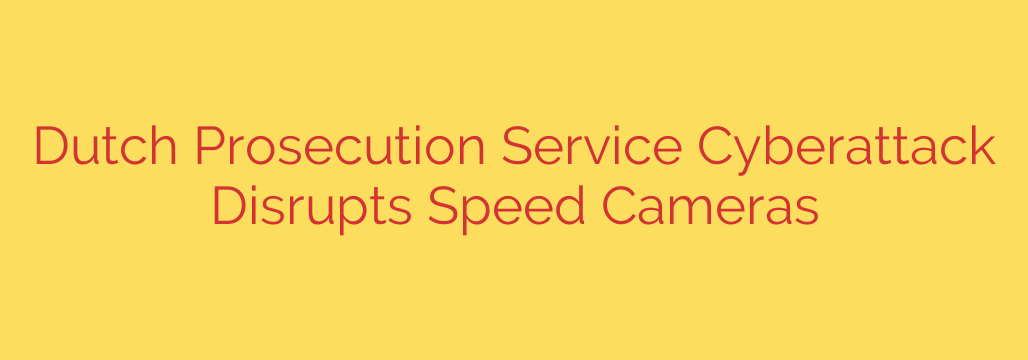
Cyberattack on Dutch Authorities Halts Speed Camera System
A significant cyberattack has targeted the Dutch Public Prosecution Service (Openbaar Ministerie, or OM), forcing a critical component of the nation’s traffic enforcement system offline. The attack specifically disrupted the central processing unit responsible for handling digital images from speed and red-light cameras across the country, highlighting the increasing vulnerability of essential government infrastructure to digital threats.
In response to the security breach, officials made the immediate decision to take the affected systems offline to prevent further damage and begin a thorough investigation. This swift action was necessary to contain the threat and assess the full extent of the intrusion.
What Was the Immediate Impact?
The primary consequence of this cyberattack is the disruption of the automated traffic violation process. The system under attack is the central hub where data from roadside cameras is received, processed, and used to issue fines.
Key impacts include:
- Interrupted Data Flow: The connection between the nationwide network of speed and red-light cameras and the central processing server was severed. This means that for a period of time, the cameras were unable to transmit violation data.
- Potential for Unprosecuted Violations: As a direct result of the system outage, it is highly likely that a number of traffic violations captured during the disruption will not be processed. Authorities are currently working to determine the exact timeframe of the outage and how many infractions may be affected.
- Focus on System Restoration: The priority for the Public Prosecution Service is now to securely restore the system’s functionality. The investigation is running parallel to recovery efforts to ensure the network is fully protected before it is brought back online.
Was Personal Data Compromised?
In any cyberattack involving government systems, the security of personal data is a paramount concern. According to official statements, the initial investigation provides some reassurance. At this stage, there is no evidence to suggest that the attackers accessed or stole any personal data. The primary motive of the attack appears to have been disruption rather than data theft. This suggests the incident was likely aimed at causing operational chaos rather than compromising citizen information.
A Wake-Up Call for Critical Infrastructure Security
This incident serves as a stark reminder that as public services become more digitized, they also become more attractive targets for malicious actors. The attack on the Dutch traffic enforcement system is not just an IT issue; it’s a matter of public safety and state security. It demonstrates how a digital breach can have tangible, real-world consequences, temporarily disabling a key function of law enforcement.
This event underscores the critical need for robust cybersecurity measures across all levels of government. Protecting digital infrastructure is no longer optional—it is essential for maintaining the continuity and integrity of public services.
Key Security Lessons and Proactive Measures
While the investigation is ongoing, this attack offers valuable lessons for organizations managing critical systems. To defend against similar threats, a multi-layered security strategy is essential.
Implement Robust Incident Response Plans: The Dutch authorities’ quick decision to take the system offline was a crucial step in containing the attack. Having a pre-defined incident response plan allows organizations to act decisively, minimize damage, and begin recovery without delay.
Prioritize Network Segmentation: Isolating critical systems from other parts of a network can prevent an attack from spreading. If the traffic enforcement system was properly segmented, a breach in one area would be less likely to compromise the entire infrastructure.
Conduct Continuous Monitoring and Threat Hunting: Modern cyberattacks are sophisticated and often go undetected for long periods. Proactive, 24/7 monitoring of network traffic and system logs is vital for detecting suspicious activity early, before a full-blown crisis erupts.
As authorities work to bring the system back online, this attack will be analyzed closely by security experts in both the public and private sectors. It is a clear signal that the front lines of national security now extend deep into the digital realm.
Source: https://go.theregister.com/feed/www.theregister.com/2025/08/15/cyberattack_on_dutch_prosecution_service/








